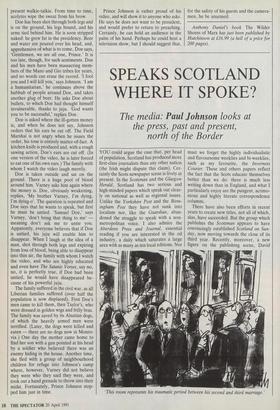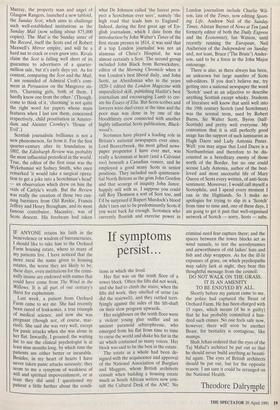SPEAKS SCOTLAND WHERE IT SPOKE?
the press, past and present, north of the Border
YOU could argue the case that, per head of population, Scotland has produced more first-class journalists than any other nation (the Irish might dispute this claim). Cer- tainly the Scots newspaper scene is lively at present. In the Scotsman and the Glasgow Herald, Scotland has two serious and high-minded papers which speak out clear- ly on national as well as regional issues. Unlike the Yorkshire Post and the Birm- ingham Post they have not sunk into localism nor, like the Guardian, aban- doned the struggle to speak with a non- metropolitan voice. I also admire the Aberdeen Press and Journal, essential reading if you are interested in the oil industry, a daily which saturates a large area with as many as ten local editions. Nor
must we forget the highly individualistic and flavoursome weeklies and bi-weeklies, such as my favourite, the Inverness Courier. These and others papers reflect the fact that the Scots educate themselves better than we do: there is much less writing down than in England, and what I particularly enjoy are the pungent, acrimo- nious and highly literate correspondence columns.
There have also been efforts in recent years to create new titles, not all of which, alas, have succeeded. But the group which publishes the Scotsman appears to have convincingly established Scotland on Sun- day, now moving towards the close of its third year. Recently, moreover, a new figure on the publishing scene, David `This room represents his traumatic period between his second and third marriage.' Murray, the property man and angel of Glasgow Rangers, launched a, new tabloid, the Sunday Scot, whch aims to challenge such well-established institutions as the Sunday Mail (now selling about 875,000 copies). The Mail is the Sunday sister of the Record, itself the Scots end of Robert Maxwell's Mirror empire, and will be a hard nut to crack or even gnaw into. Rivals claim the Scot is falling well short of its guarantee to advertisers of a quarter- million sale, but it's early days yet. As for content, comparing the Scot and the Mail, I am reminded of Admiral Croft's com- ment in Persuasion on the Musgrove sis- ters, 'Charming girls, both of them. I hardly know one from the other.' (Though, come to think of it, 'charming' is not quite the right word for papers whose main features when I last saw them, concerned respectively, child prostitution in Amster- dam and Aleister Crowley's 'House of Evil'.) Scottish journalistic brilliance is not a new phenomenon, far from it. For the first quarter-century after its foundation in 1802, the Edinburgh Review was probably the most influential periodical in the world. True, the editor of the first issue was the Wykehamist wit Sydney Smith, who once remarked 'it would take a surgical opera- tion to get a joke into a Scotchman's head' — an observation which drew on him the vials of Carlyle's wrath. But the Review was really the creation of those two cun- ning barristers from Old Reekie, Francis Jeffrey and Henry Brougham, and its most famous contributor, Macaulay, was of Scots descent. His forebears had taken what Dr Johnson called 'the fairest pros- pect a Scotchman ever sees', namely 'the high road that leads him to England'. Indeed, during the first great age of En- glish journalism, which I date from the introduction by John Walter's Times of the first steam presses in 1814, it was said that if a top London journalist was not an alumnus of Christ's Hospital, he was almost certainly a Scot. The second group included John Black from Berwickshire, editor of the Morning Chronicle when it was London's best liberal daily, and John Scott, an Aberdonian who in the years 1820-1 edited the London Magazine with unparalleled skill, publishing Hazlitt's best journalism and encouraging Lamb to cre- ate his Essays of Elia. But Scots scribes and lawyers were duel-crazy at the time and the poor man was done in by one of the bloodthirsty crew connected with another highly influential Scots publication, Black- wood's.
Scotsmen have played a leading role in Britain's national newspapers ever since. Lord Beaverbrook , the most gifted news- paper proprietor I have ever met, was really a Scotsman at heart (and a Calvinist too) beneath a Canadian veneer, and he employed a good many Scots in senior positions. They included such quintessen- tial North Britons as the grim John Gordon and that scourge of iniquity John Junor, happily still with us. I suppose you could call Roy Thomson a sort of Scot too, and I'd be surprised if Rupert Murdoch's blood didn't turn out to be predominantly Scots if you went back far enough. Scotsmen who currently flourish and exercise power in London journalism include Charlie Wil- son, late of the Times, now editing Sport- ing Life, Andrew Neil of the Sunday Times, Alistair Burnet of News at Ten (and formerly editor of both the Daily Express and the Economist), Ian Watson, until recently running the European, Neil Ascherson of the Independent on Sunday and, not least, Bruce (The Brute') Ander- son, said to be a force in the John Major entourage.
There is also, as there always has been, an unknown but large number of Scots sub-editors. If you don't believe me, try getting into a national newspaper the word 'Scotch' used as an adjective to describe anything Scottish except whisky. Students of literature will know that until well into the 19th century Scotch (and Scotchman) was the normal term, used by Robert Burns, Sir Walter Scott, Byron (half- Scottish) and pretty well everyone. My contention that it is still perfectly good usage has the support of such luminaries as Hugh Dacre and Lady Antonia Pinter. Well: you may argue that Lord Dacre is a Northumbrian and therefore to be dis- counted as a hereditary enemy of those north of the Border, but no one could accuse Lady Antonia, author of the best- loved and most successful life of Mary Queen of Scots every written, of anti-Scots sentiment. Moreover, I would call myself a Scotophile, and I spend every moment I can in the Highlands. So I make no apologies for trying to slip in a 'Scotch' from time to time and, one of these days, I am going to get it past that well-organised network of Scotch — sorry, Scots — subs.



























































 Previous page
Previous page